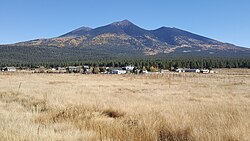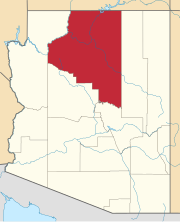Fort Valley, Arizona
Fort Valley, Arizona | |
|---|---|
 | |
 Location of Fort Valley in Coconino County, Arizona. | |
| Coordinates: 35°19′22″N 111°44′23″W / 35.32278°N 111.73972°W | |
| Country | United States |
| State | Arizona |
| County | Coconino |
| Area | |
• Total | 72.45 sq mi (187.65 km2) |
| • Land | 72.45 sq mi (187.65 km2) |
| • Water | 0.00 sq mi (0.00 km2) |
| Elevation | 8,376 ft (2,553 m) |
| Population (2020) | |
• Total | 1,682 |
| • Density | 23.22/sq mi (8.96/km2) |
| Time zone | UTC-7 (MST (no daylight saving time)) |
| Area code | 928 |
| FIPS code | 04-25045 |
| GNIS feature ID | 2582786[2] |
Fort Valley is a census-designated place in the southern portion of Coconino County in the state of Arizona, United States. Fort Valley is located very close to the city of Flagstaff. The population as of 2010, was 779.[3]
History
[edit]Fort Valley is a historical settlement at the base of Mt. Agassiz in Flagstaff, Arizona. It gained its name as a fort that was established to defend against Apache tribes although it was never actually used. Wagon trains migrating from the east came upon Flagstaff and settled here. Many of the old settlements can still be seen today. The primary motivation for this settlement was logging as was true for the rest of Flagstaff. The ponderosa pine forest supplied abundant amounts of timber which were then transported via railroad.
The first Fort Valley settlers were Laura and William Murphy in 1881, they belonged to the church of Jesus Christ of Latter Day Saints. After these first settlers many more followed. Eventually a small community was developed and Fort Valley became a ranching hub in northern Arizona. As ranching took hold in Fort Valley the effect on the environment was devastating. Water sources such as Leroux spring ran dark with silt and the land was becoming a victim of overgrazing. In 1908 Gustaf Adolf Pearson arrived in Fort Valley as a member of the forest service and began to revive the area.
Fort Valley was also a popular hub for the scientific community to collect data on recently obtained land in the Southwest. Because of the unique combination of a desert and a mountain environment the area was particularly interesting for geologists, paleontologists, and scientists alike.
Present
[edit]Fort Valley remains a settlement today. The suburb of Flagstaff Arizona still holds a number of small farms and ranches. The Leroux spring has been taken over by the city of Flagstaff and the city is considering it as a potential water source. Fort Valley remains a wide open meadow at the base of what is now Snowbowl Road. Much of the past wildlife such as deer, herons, and elk remain in the area.
Demographics
[edit]| Census | Pop. | Note | %± |
|---|---|---|---|
| 2020 | 1,682 | — | |
| U.S. Decennial Census[4] | |||
Climate
[edit]According to the Köppen Climate Classification system, Fort Valley has a dry-summer humid continental climate, abbreviated "Dsb" on climate maps.
| Climate data for Fort Valley, Arizona (1991–2020 normals, extremes 1909–2018) | |||||||||||||
|---|---|---|---|---|---|---|---|---|---|---|---|---|---|
| Month | Jan | Feb | Mar | Apr | May | Jun | Jul | Aug | Sep | Oct | Nov | Dec | Year |
| Record high °F (°C) | 65 (18) |
70 (21) |
76 (24) |
80 (27) |
90 (32) |
97 (36) |
101 (38) |
96 (36) |
90 (32) |
85 (29) |
75 (24) |
69 (21) |
101 (38) |
| Mean maximum °F (°C) | 57.2 (14.0) |
59.5 (15.3) |
66.3 (19.1) |
73.3 (22.9) |
81.3 (27.4) |
89.8 (32.1) |
91.3 (32.9) |
87.2 (30.7) |
82.7 (28.2) |
76.0 (24.4) |
67.7 (19.8) |
60.0 (15.6) |
92.7 (33.7) |
| Mean daily maximum °F (°C) | 46.3 (7.9) |
48.1 (8.9) |
54.4 (12.4) |
62.0 (16.7) |
70.8 (21.6) |
81.6 (27.6) |
83.6 (28.7) |
81.3 (27.4) |
76.0 (24.4) |
65.9 (18.8) |
54.9 (12.7) |
45.9 (7.7) |
64.2 (17.9) |
| Daily mean °F (°C) | 31.6 (−0.2) |
33.8 (1.0) |
39.1 (3.9) |
44.5 (6.9) |
51.7 (10.9) |
60.6 (15.9) |
66.5 (19.2) |
65.1 (18.4) |
58.4 (14.7) |
48.0 (8.9) |
38.7 (3.7) |
31.2 (−0.4) |
47.4 (8.6) |
| Mean daily minimum °F (°C) | 16.9 (−8.4) |
19.6 (−6.9) |
23.7 (−4.6) |
27.1 (−2.7) |
32.7 (0.4) |
39.6 (4.2) |
49.3 (9.6) |
49.2 (9.6) |
40.8 (4.9) |
30.1 (−1.1) |
22.5 (−5.3) |
16.4 (−8.7) |
30.7 (−0.7) |
| Mean minimum °F (°C) | −5.9 (−21.1) |
−1.7 (−18.7) |
5.7 (−14.6) |
12.8 (−10.7) |
19.9 (−6.7) |
26.2 (−3.2) |
34.6 (1.4) |
36.2 (2.3) |
25.9 (−3.4) |
15.7 (−9.1) |
3.8 (−15.7) |
−4.9 (−20.5) |
−9.1 (−22.8) |
| Record low °F (°C) | −37 (−38) |
−32 (−36) |
−22 (−30) |
−7 (−22) |
6 (−14) |
19 (−7) |
25 (−4) |
20 (−7) |
11 (−12) |
−9 (−23) |
−16 (−27) |
−30 (−34) |
−37 (−38) |
| Average precipitation inches (mm) | 2.10 (53) |
2.47 (63) |
1.81 (46) |
0.90 (23) |
0.89 (23) |
0.23 (5.8) |
2.78 (71) |
3.38 (86) |
1.82 (46) |
1.28 (33) |
1.33 (34) |
1.61 (41) |
20.60 (523) |
| Average snowfall inches (cm) | 10.6 (27) |
8.4 (21) |
2.8 (7.1) |
1.1 (2.8) |
0.0 (0.0) |
0.1 (0.25) |
0.0 (0.0) |
0.0 (0.0) |
0.0 (0.0) |
0.4 (1.0) |
1.8 (4.6) |
5.2 (13) |
30.4 (77) |
| Average precipitation days (≥ 0.01 inch) | 7.6 | 8.6 | 6.6 | 4.5 | 4.2 | 2.2 | 11.2 | 13.1 | 7.5 | 4.8 | 4.5 | 6.8 | 81.6 |
| Average snowy days (≥ 0.1 inch) | 3.3 | 3.6 | 1.0 | 0.6 | 0.0 | 0.0 | 0.0 | 0.0 | 0.0 | 0.3 | 0.6 | 1.6 | 11.0 |
| Source: National Oceanic and Atmospheric Administration[5][6] | |||||||||||||
Education
[edit]It is in the Flagstaff Unified School District.[7]
The zoned secondary schools are Mount Elden Middle School and Flagstaff High School.[8]
See also
[edit]- Coyote Springs, Arizona and Colton House, nearby, home of research on ponderosa pines
References
[edit]- ^ "2020 U.S. Gazetteer Files". United States Census Bureau. Retrieved October 29, 2021.
- ^ a b U.S. Geological Survey Geographic Names Information System: Fort Valley, Arizona
- ^ "AZ – Fort Valley CDP". U.S. Census Bureau. Archived from the original on April 3, 2014. Retrieved April 3, 2014.
- ^ "Census of Population and Housing". Census.gov. Retrieved June 4, 2016.
- ^ "NOWData - NOAA Online Weather Data". National Oceanic and Atmospheric Administration. Retrieved August 14, 2022.
- ^ "U.S. Climate Normals Quick Access – Station: Ft Valley, AZ". National Oceanic and Atmospheric Administration. Retrieved January 28, 2023.
- ^ "2020 census - school district reference map: Coconino County, AZ" (PDF). United States Census Bureau. p. 4 (PDF pp. 5/5). Archived (PDF) from the original on October 9, 2022. Retrieved September 12, 2024. - Text list
- ^ "2010/2011 Middle (6–8) and High (9–12) School Attendance Areas" (PDF). Flagstaff Unified School District. Retrieved September 12, 2024. – Compare to the US Census Bureau maps.
Further reading
[edit]- Olberding, Susan. Fort Valley Then and Now. Fort Valley Publishing.[ISBN missing]
- Vankat, John L. The San Francisco Peaks and Flagstaff: Through the Lens of Time ISBN 978-1-7349899-3-9
External links
[edit]![]() Media related to Fort Valley, Arizona at Wikimedia Commons
Media related to Fort Valley, Arizona at Wikimedia Commons


